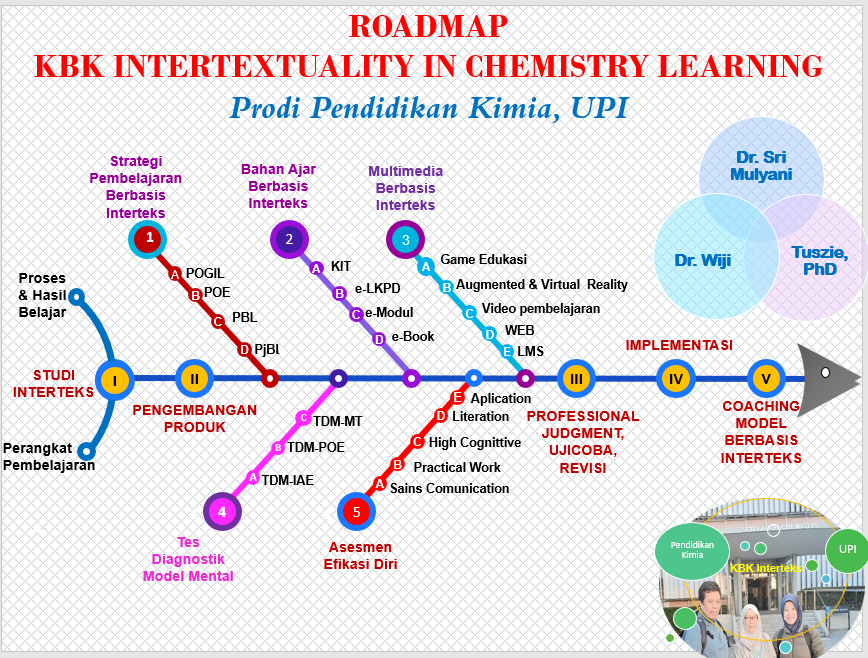Intertextual Chemistry Learning
Developer
Dr. Sri Mulyani, MSi
Dr. Wiji, MSi
Tuszie Widhiyanti, PhD
Address
Chemistry Education Study Program, University of Education Indonesia
Room 516 5th floor, JICA Building FPMIPA UPI
Jl. Dr. Setiabudhi 229 Bandung
HP. 081321113964
Description
The Intertextuality in Chemistry Learning Study Group (KBK Interteks) in the Chemistry Education Study Program at UPI, has and continues to develop research that is useful for education in Indonesia, especially in Chemistry learning since 2008. The purpose of this KBK is to produce intertextual-based chemistry learning tools both manual and digital that are ready to be implemented as a solution to the problems and difficulties faced by students, chemistry teachers, and prospective chemistry teacher students in building a complete mental model of chemistry and self-efficacy. Not only that, this KBK also develops mental model diagnostic tests and various self-efficacy assessments to find out the achievements and problems faced, so as to produce appropriate and targeted solutions. The main studies in this KBK include chemistry learning intertext studies, intertext-based learning strategies, intertext-based teaching materials, intertext-based multimedia, mental model diagnostic tests (TDM), self-efficacy assessments, and intertext-based coaching models.
The intertext study of chemistry learning was conducted to find out the learning process and outcomes as well as the existing learning tools in the field. The results of this study show that students have difficulty and many misconceptions in understanding chemistry in almost all concepts. The learning tools developed by teachers are very monotonous and do not present chemistry concepts in multirepresentations, and are less integrated with various skills needed by students. Therefore, intertextual learning strategies continue to be developed with various innovative learning models that emphasize student center and are in accordance with the applicable curriculum in Indonesia such as POGIL, POE, PBL, and PjBL. In the intertext-based learning strategy, students are facilitated to master and link various “texts” that can build the meaning of chemistry learning. The feasibility test of the learning strategy is carried out through expert validation and is tested repeatedly and increasingly widespread until the most appropriate intertextual-based learning strategy is obtained. To support the learning process, teaching materials and intertext-based multimedia were also developed. The teaching materials developed include e-LKPD, learning kits, e-modules, and e-books. While the multimedia developed includes educational games, learning videos, augmented & virtual reality, WEB-based learning, and LMS.
As a complete learning tool, KBK intertext also develops assessments to analyze students' concept mastery in the form of Mental Model Diagnostic Tests (TDM). So far, three types of TDM have been developed, namely: interview about event (TDM-IAE), predict-observe-explain (TDM-POE), and multi-tier (TDM-MT). In addition, assessments were also developed to measure self-efficacy which include: high cognitive, practical work, communication skills, literacy, and application. In order for the research results to be utilized by a wide audience, it is necessary to conduct intertext-based model coaching which is usually carried out in workshops and training activities. The research roadmap on the intertext KBK is summarized in the following figure:



